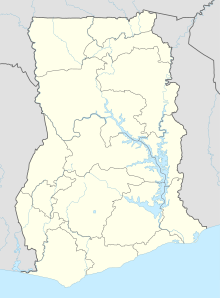Salaga
Coordinates: 8 ° 33 ′ N , 0 ° 31 ′ W
Salaga is a city in the Savannah region of Ghana , 120 km south-southeast of the city of Tamale , and the capital of the East Gonja District . It is located just under 30 km from the north-western arm of the Volta reservoir .
In the 18th and 19th centuries, Salaga was one of the most important trading cities in what is now northern Ghana, as the end or junction of several trade routes from the north to the coast. As part of the Kingdom of Dagomba, Salaga had to pay tribute to the Ashanti Empire from 1744 and was one of the most important "transshipment points" for slaves and kola nuts . It also played an important role in the trade between the Ashanti Empire and the kingdoms of the Mossi and Gonja in the north. Due to its cosmopolitan population and its importance for trade, Salaga was called the " Timbuktu of the South" during this period .
Like many other trading cities of its time, the city was inhabited by different ethnic groups, each with their own districts. Estimates of the total number of the population vary between 20,000 and 50,000 people. The Hausa language served these groups as the lingua franca ( lingua franca ). The Muslims formed the religious majority, with many Muslims at the same time adhering to the traditional faith.
When the British defeated the Ashanti in 1874, the city's Gonja population also revolted, killing hundreds of Ashanti. Then it went down with the Salaga trading point, especially since the slave trade was now prohibited. In 1892 there was also civil war in the region. In 1897 the British besieged the city. At the end of the 19th century, Salaga was controversial between the British and Germans, who for a time viewed it as the Salaga area as a neutral buffer between their colonial empires. Around 1900 Salaga was only a resting point for caravans ( Zongo ).
The Wonkan bawa , the place where slaves were bathed and a baobab tree at the place where the slave market used to be, still reminds of Salaga's past as an important slave trading place.
literature
- Johnson, Marion. "The Slaves of Salaga." The Journal of African History 27.2 (1986): 341-362.
- Lovejoy, Paul E. "Polanyi's" Ports of Trade ": Salaga and Kano in the Nineteenth Century." Canadian Journal of African Studies 16.2 (1982): 245-277.
